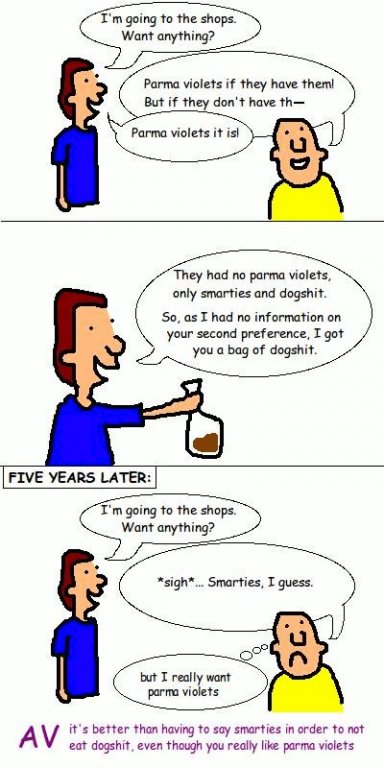I’m not going to write some long piece on AV. The airwaves and the internet are full of it.
Most of the coverage, you’ll have noticed, is frighteningly shoddy, patronising, alarmist and cheap – everything we all hate about British politics.
Plus ca change.
But I’m not seeing much on the particular aspect which concerns me, so I’ll have to set it out myself.
It is the part of AV where it works just as its supporters hope it will. It’s also the very part of AV I don’t like.
Here goes. Bear with me. It’s not too nerdy. I promise.
Think of a constituency much like that of my home-town, the Isle of Wight.
Here the natural relative majority is Tory at, say, 45%.
(By “relative” majority, I mean more votes than any other candidate, but not more than half the vote – what the Americans sometimes call a “plurality”. More than 50% would be an “absolute” majority, and in that case AV would not apply.)
LibDems are second on, say, 31%.
Labour are very much third on, say, 20%. Other parties make up the remaining 5%.
Under FPTP, the Tories clearly win. Grrr.
I don’t live on the Isle of Wight anymore. In my day, a vote for Labour was a “wasted” vote and if you were left-minded, you voted Liberal instead. Steve Ross, our Liberal guy, had a strong personal vote, so voting tactically for him made real sense. He was our MP for many years in what I think is “really” a Tory seat.
These days Steve is gone and the seat is Tory-held on a relative (not absolute) majority.
Were I to return to the Island and cast my vote there, AV supporters would seek to console me.
They’d say – vote for Labour first, then LibDem second. If all your Labour colleagues do the same, then your combined vote will hit 51%, and the LibDem will get in. Otherwise your least favourite candidate, the Tory, will win the seat with just 45% under FPTP.
This is exactly the kind of situation in which AV shows its power.
It allows a “coalition of opposition” to the relative-majority candidate.
It delivers an MP with more “support” (51%) than the relative-majority Tory (45%) of the existing system.
And that has to be fairer, right?
Well, happy as I am in this imagined scenario to see the Tories lose, I just don’t think it’s fair.
I don’t think it’s fair that the second choices of me and my Labour mates are conjoined with the LibDem vote to trump the first-choices of the Tory voters.
My Labour candidate came last. His values and views are not widely supported in the local community. So why should his supporters’ second choices count equally against the first choices of the Tory candidate, who, after all, has more support in the community than any other single candidate?
What AV completely fails to take into account is strength of feeling. I really want Labour to win. My second choice might well be LibDem, but I don’t – in anything other than the technical sense – support the LibDems. At the moment, it is fairer to say I despise them.
At the same time, I have to accept that the Tory voters probably really want the Tory candidate to win. These strong preferences ought to count for much more than my very weak and reluctant second “preference” for the LibDem candidate.
They do not. The Tory voter’s strong first preferences are trumped by my weak and reluctant second preferences being lumped together with the support for the LibDem candidate.
In precisely the real-world example where AV might “work”, it delivers results which in my view are unfair.

There’s a cartoon going round saying AV is like ranking your preferences for Parma Violets, Smarties or dog shit.
If the shop doesn’t have those Parma Violets, and if you don’t (or can’t) identify Smarties as your second preference, you might just end up with a little stripey bag of dogshit.
Of course, this is a loaded and biased example.
Because Smarties are quite a nice second choice.
What if, like me – and I think like very many others – you want your first choice so much more than your subsequent choice that all the other choices are simply gradations of shit?
If everyone has the choice of sweeties or shit, then a system under which the most people get what they think is a sweetie is the fairest one.
That system is first past the post.
One last example. It’s loaded too, but it’s also a genuine story.
I remember one Christmas with the in-laws. You know the score. Eating and presents done, and all the family – aunts and cousins and all the generations – sits down to watch the TV. It’s a sticky moment: how to decide, in the company of people who come together once every other year, which channel to watch?
On this occasion, most wanted the action film. The youngsters piped up for a kids’ programme. But the old’uns didn’t want the action film or the kids’ programme. They wanted a musical. The line of least contention – everyone’s second choice – was, if I remember rightly, a game show.
It was a proper, polite, wholesome compromise. Some ten minutes in, I was bored out of my tiny mind. I looked around. The kids were bored too. So were the adults. So were the old’uns. Nobody was really watching. Nobody was getting what they wanted.
We had chosen our channel under a kind of impromptu AV. I remember wishing we’d done it on a show of hands: old-fashioned first past the post. At least then we’d have gone for the channel which made the biggest single group of people happy. Instead we were all sitting there politely enduring the compromise nobody wanted.
Strength of feeling matters. First choices matter. That’s why I’m voting No to AV.


